Thank you so much. Truly, Beth and I are very grateful for those who helped us spread the word and for those who tuned in to the on-line conversation last week that we hosted with Dr. Paul Metzger of the New Wine/New Wineskins Institute out at Multnomah College in the grand Pacific Northwest. IVP Academic, who published his excellent, hefty study of personalism called More Than Things: A Personalist Ethics for a Throwaway Culture put the tech piece together and Paul and I had an invigorating and fun — at the very least for us, but we’ve heard that others liked it, too — discussion on personhood, a Trinitarian theological basis for caring about the dignity of humans made in God’s image, and a whole host of pressing ethical questions in various social spheres. From abortion and end of life issues to creation-care and climate change, from personal and institutional racism to gender and human sexuality, from medical ethics to drone warfare (and even on to “The Last Frontier”, space exploration) Paul carefully offers perspective and insight and Biblically-informed reading on a personalist emphasis.
The live video conversation was recorded. You can watch it HERE. We hope we were personal and welcoming to all, somehow redeeming a bit of this too often polarizing and inhumane technological space. Check it out, please.
One of Paul’s early mentors was the great evangelical hero who has taught many about race and grace, about injustice and public righteousness, John Perkins. Paul’s chapter on race in More Than Things is a major contribution to serious thinking about such matters and I very highly recommend it. As with the other topics Metzger addresses, our society (not to mention most churches) really needs a re-think and a re-do. We’ve got to learn from the past, denounce idols and reductionisms, forge a Biblically-shaped ethic, and offer a “new song” from the Lord, paving the way to reconciliation and restoration and hope. Metzger has been at this work on racism a long time and we honor him for it.
In this big BookNotes I want to offer a reminder to PRE-ORDER a couple of important soon-to-be-released books (scroll down) about race that should be on your list of must-reads this fall. First, I highlight a few current books that are very, very good, in this field. I’ll try to be succinct. We really hope you enjoy this BookNotes. Share it with others if you can.
One of the ones I’m listing this week, with which I will start this list, is one of the best books I’ve read all year. Read on!
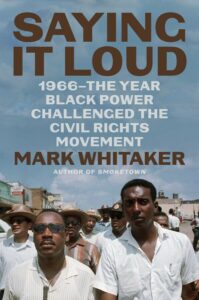 Saying It Loud: 1966 – The Year Black Power Challenged the Civil Rights Movement Mark Whitaker (Simon & Schuster) $29.99 OUR SALE PRICE = $23.99
Saying It Loud: 1966 – The Year Black Power Challenged the Civil Rights Movement Mark Whitaker (Simon & Schuster) $29.99 OUR SALE PRICE = $23.99
Yes, indeed, this is not only one of the very best books about the history of the civil rights movement, it was so captivating, so gripping, so informative, that I’d say it was one of the best page-turners I have ever read. And I’ve read a lot about the civil rights era and a lot of investigative reporting and popular history. I’ve been wanting to tell BookNote friends about it for months now, and it seems now the time is right. We are approaching the grand 60th anniversary of the legendary March on Washington (1963) that even school kids know about. What happened before that and after, is legendary. Saying It Loud jumps back and forth sharing the whole big picture of the movement from the early 60s to the early 70s, but its structure is simple. It unfolds month by month in one pivotal year. I would bet that all but the most rare scholar of the movement will know all this stuff and it has now become my go-to book for anyone to read who wants to understand the virtues and faith and struggles and tragedies — and, yes, the huge ideological differences that came to the fore — during this most remarkable era of American history.
If you, like me, came of age in the late 60s or so, you will want to read this book. Come on, despite all the names that you heard on the news — Stokely Carmichael, Huey Newton, and Bobby Seal, just for instance, not to mention the larger backdrop of music and art and war and protest that was simmering in that era — I bet you don’t know the backstory of each of them. And what stories they are! You have got to read this book!
And if this new to some of you, great. It’s a part of American history you have to know. This book is a great starter. No matter your age or era, this will teach you well.
As you probably know, there was among most civil rights leaders (and the rank and file folks who were involved) a profound commitment, guided by Rev. Martin Luther King, Jr. (and others) to faith-based, even Biblical, nonviolence. From King’s Christian personalism and Gandhian training in direct action and profound loyalties to American civic principles, the movement, radical as it was, was rooted in this vision of law and order and goodness and truth. King and John Lewis and others from the Student Nonviolent Coordinating Committee (SNCC, or “snick” as it was often called) were Christians, after all, and the black church served as the hub of most campaigns of protesting segregation and, then, eventually voter registration drives. That changed in 1966.
And what a lot of trouble it was, inside the movement. Young activists were increasingly influenced by the vibrant Malcom X and they increasingly insisted that there needed to be more teaching about black self-regard (and self-protection.) Black Is Beautiful became a slogan and the Black Panthers rose up with guns, famously in Oakland, California. There were meetings and debates and councils amidst murders and jailings, visits from government officials and heoric entertainers and donors. There was prayer and politics and personality squabbles and more.
Of course the Panthers — one of the most ubiquitous names from the news of my youth — did more than the paramilitary training that white media showed. They had excellent feeding projects and after-school programs and taught discipline and self-respect and civic action. The Black Arts movement was starting up in Harlem, too, led by LeRoi Jones, who would soon change his name to Amiri Baraka, which Whitaker explores. This even gave rise to the new holiday known as Kwanzaa. The times they were a-changin’.
By the way, I did not know (I’m a little embarrassed to admit) that the name and mascot of the militant urban, mostly West Coast Black Panther group came first from a rural Alabama voting rights group which actually became a black political movement running as an independent third party later that year. They really were, first, a political party.
(The Lowndes County Freedom Organization emerged after some organizers that were on the famous 1965 March from Selma to Montgomery stopped and stayed with local residences there. The NAACP had been banned in the state at that point and some of Fred Shuttlesworth’s Christian Movement for Human Rights were involved as well, creating a poltical alternative to the segregationist party headed by George Wallace (a Democrat, who literally used the phrase “White Supremacy” in the local Democrat party’s logo.)
These were earth-shaking times and no book that I know of tells the story so boldly, with so many amazing digressions and fascinating rabbit trails with helpful explanations of the past and glimpses, occasionally, to where it all would lead. John Adams had said it in colonial times, and it was true in 1966: these are serious times.
Mark Whitaker is a great storyteller, an excellent journalist, and a very fine writer. Some of you reading this know his marvelous book on the under-reported story of the extraordinary early 20th century experience in black quarters in Pittsburgh, paralleling the famous Harlem renaissance, called Smoketown: The Untold Story of the Other Great Black Renaissance.The verve and brilliance and detail of that book is shown even more in the fast-paced Saying It Loud. And the issues explored —is nonviolence necessary and effective? how do we make room for activists of various or no faiths? what is the relationship between the arts and social change? how can women and men lead together? does civil rights work look different in the south and north (and rural and urban settings)? and on and on — are with us today. If you care even a little about the voices of BLM, or you want, perhaps, a more traditional approach to faith-based organizing, you need to read this book.
Allow me to note three more quick things about the value of Saying It Loud.
First, as I implied, it covers the history and tone of the civil rights movement so very well. Although it is rooted in the long year of 1966, as Whitaker introduces a character — say, Stokely Carmichael, or Huey Newton, just for instance — it explores their back story, their own biographies, their dedicated (if sometimes contentious) work in the rural towns of Mississippi or Alabama, moving from events in Memphis or Little Rock to Selma or Atlanta, among movers and shakers and among those who could not read or write. The way these men (and many women, too) were beaten and threatened (and some, in the narrative, were murdered) was appalling; reading it again was shocking, even as we all know this is how it was. The reporting is so vivid and the history unfolding so fast and furious that one cannot but gasp, and cry out to God in remorse and repentance. That white folks were so cruel, so vicious, so funded and evil and that young men and women working for change were so brave, so dedicated, so willing to suffer and to serve — what stories! These mini-biographies woven naturally into the narrative of the dedication (often) or personal difficulties (often, as well) of the main players in the drama are excellent. Saying It Loud is the best one-stop read to learn so very, very much and be taken into the heart of the struggles for so many. I very highly recommend it.
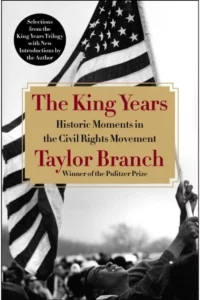 Previously, by the way, I have often recommended the excellent, concise abridgment of the world-class, huge, three volume history of the era, America in the King Years by Taylor Branch called The King Years: Historic Moments in the Civil Rights Movement (Simon & Schuster; $17.99 – OUR SALE PRICE = $14.39.) That is still excellent, and offers a historians overview of key moments, or episodes, in the struggle, but Saying It Loud tells of the people and their bravery, failures, angers, prayers, and accomplishments. Wow.
Previously, by the way, I have often recommended the excellent, concise abridgment of the world-class, huge, three volume history of the era, America in the King Years by Taylor Branch called The King Years: Historic Moments in the Civil Rights Movement (Simon & Schuster; $17.99 – OUR SALE PRICE = $14.39.) That is still excellent, and offers a historians overview of key moments, or episodes, in the struggle, but Saying It Loud tells of the people and their bravery, failures, angers, prayers, and accomplishments. Wow.
Secondly, this recent one by Mark Whitaker really does offer a brilliant look into what was, surely, one of the most consequently shifts of thinking in perhaps all of American public life, and while it cannot be (and ought not be) reduced to a debate between Martin King and Malcom X, the occasions of the two men meeting is told wondrously by Mr Whitaker. If only either had lived longer to see how the debate about Christianity, nonviolence, black separatism, and political reform might have played out. The story is tragic but Whitaker tells it with energy and passion. The consequent move away from King’s nonviolent mass movement is a historical reality that needs to be deeply explored and Whitaker gets us towards an understanding of the beginning of a pivotal end of an era.
Thirdly, again, with the thrust of the book being as it must be — the shift away from nonviolence and the leadership of King to Black Power the rise of the Panthers — it nonetheless shows how these differing approaches to civil rights and better lives for black citizens, are still related. Yes, there arises a different strategy, and yes, it is more than a change in tactics (about violence or how to do voter registration, say, or a shift from the rural south to the teeming ghettos of the north) but a new generation’s whole worldview. The times saw an ideological shift and a cultural shift and a political shift. As reviewer Michael Eric Dyson notes, “Whitaker brilliantly tracks the rise and fall of Black Power and how its lessons echo across the decades and thunder in today’s headlines.” Indeed. The book is for today!
Saying it Loud: 1966 is a tour de force, a major contribution, a fascinating page-turner, a great read. Please stick with me, here, and read the following blurbs from the back, which are rich and will perhaps inspire you to order the book.

I was in high school in 1966, and it felt like the edge of history. In his brilliant new book, Saying It Loud, Mark Whitaker has taken me back there, and the journey is both enthralling and a riveting reminder of the tumult, inspiration, and potent possibilities of the Black Power movement. It’s also novelistic in its fully realized human portraits of the movement’s backstory. I can’t say it any louder: this is not only a compelling read; it’s essential for understanding where we started and where we might find lessons in determining where we go from here. — Henry Louis Gates, Jr., Harvard University
The years that Mark Whitaker chronicles in Saying It Loud were years I well knew as a young reporter and also as a Black Southerner who came out of the Civil Rights Movement when much of the complicated (and yes sometimes disturbing) history he delves into was being made. . . . What Saying It Loud provides, especially for the Black Lives Matter generation, is history that will help them avoid the pitfalls of their predecessors as well as a road map to the more perfect union this country has long promised but has not yet achieved. — Charlayne Hunter-Gault, journalist and author of My People: Five Decades of Writing About Black Lives
At once eloquently intimate and bracingly expansive, Saying It Loud is a tour de force. Mark Whitaker has produced a provocatively eloquent and original work of narrative history that inspires us to look upon the past with new eyes. The heroically flawed lives of the generation that shaped the year 1966 and the rise of Black Power will never look the same after reading this insightful, challenging, and thought-provoking book. — Peniel E. Joseph, author of The Third Reconstruction: America’s Struggle for Racial Justice in the Twenty-First Century
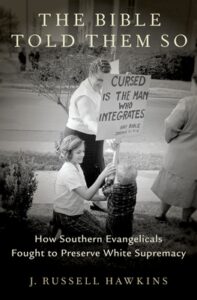 The Bible Told Them So: How Southern Evangelicals Fought to Preserve White Supremacy J Russell Hawkins (Oxford University Press) $29.95 OUR SALE PRICE = $23.96
The Bible Told Them So: How Southern Evangelicals Fought to Preserve White Supremacy J Russell Hawkins (Oxford University Press) $29.95 OUR SALE PRICE = $23.96
This is an important history volume, peer reviewed by the famous and prestigious scholarly press and laden with vital accolades. Dr. Hawkins is the Professor of Humanities and History in the John Wesley Honors College at Indiana Wesleyan University in Marion, Indiana.
The book offers, as one historian put it, “more complex stories about the interplay of race and politics” within the ranks of evangelicalism. Derek Hick, author of Reclaiming Spirit in the Black Faith Tradition says it is “stylistically unflinching while managing to remain approachable delicate” and that Hawkins “has produced a tour de force that tells an unsettling tale of certain white evangelical’s efforts to maintain a dominant social order.”
Do you recall the classic in the field of civil rights history, the extraordinary and sadly riveting volume God’s Long Summer: Stories of Faith and Civil Rights by Charles Marsh (Princeton University Press; $37.00) that we often tout? That, too, shows how various folks on different sides of the civil rights battles, used (or misused) the Bible for their own side. The Bible Told Them So shows still more, and it is both perplexing and sad, but important for us to understand. (It is my sense that this is going to become even more important as some on the alt-right are themselves, now, using the Bible to justify their ideological weirdness.)
And listen to this, importantly:
Hawkins convincingly demonstrates how religion framed, informed, and bolstered South Carolina whites’ resistance to racial equality. He further shows how, once the raw biblical justification of segregation acquired a bad reputation, the rhetoric of color-blindness and anti-identity politics carried this resistance forward under a more respectable but deceptive guise. — Carolyn Renée Dupont, author of Mississippi Praying: Southern White Evangelicals and the Civil Rights Movement, 1945-1975
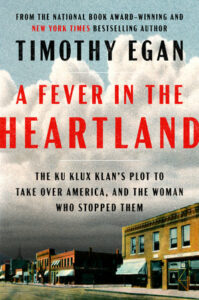 A Fever in the Heartland: The Klu Klux Klan’s Plot to Take Over America, and the Woman Who Stopped Them Timothy Egan (Viking) $30.00 OUR SALE PRICE = $24.00
A Fever in the Heartland: The Klu Klux Klan’s Plot to Take Over America, and the Woman Who Stopped Them Timothy Egan (Viking) $30.00 OUR SALE PRICE = $24.00
I have highlighted this already at BookNotes so won’t say much more other than to remind you that, before the 1950s and ‘60s civil rights movement there was this grand struggle. The KKK arose after emancipation, of course, in the south. It had, most thought, pretty much died out. But the second iteration of the Klan — with its most significant stronghold in the 1920s state of Indiana— was even more viciously racist; devoutly evil, and on the rise. This book, written with what the great writer Erik Larson says is “narrative elan”, exposes their plots of this most sinister period of American history. It shows their not very long march through the institutions of culture, their infiltrations of the courts, and into corridors of power, and it is breathtakingly ominous. Why a book!
That the KKK remains a force to be reckoned with. Similar racist, antisemitic, and neo-Nazi type groups are on the rise and even intertwined with the campaigns of Donal Trump and other Republican leaders. This book could not be more fascinating as a gripping historical study and could not be more timely.
Timothy Egan is a meticulous scholar and fine writer. You may know his award-winning book on the dust bowl years (The Worst Hard Times) that was made into a fine documentary by the great Ken Burns. Burns notes that “the influence the KKK wielded over states and policy should put a chill in every American.” Here is what Burns says about A Fever in the Heartland:
Egan has done it again, mastering another complicated American story with authority and surprising detail. The Klan here are not the nightriders of the late 19th century, but a retooled special interest group and unusually potent political power. The influence they wielded over states and policy should put a chill in every American. Bravo. –Ken Burns
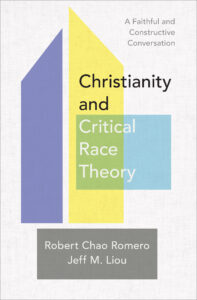 Christianity and Critical Race Theory: A Faithful and Constructive Conversation Robert Chao Romero & Jeff M. Liou (Baker Academic) $23.99 OUR SALE PRICE = $19.19
Christianity and Critical Race Theory: A Faithful and Constructive Conversation Robert Chao Romero & Jeff M. Liou (Baker Academic) $23.99 OUR SALE PRICE = $19.19
I have written about this before and I have given pleas for folks to buy it at every event this spring and summer wherever I’ve been asked to make up-front book talks. I’ve plugged it as essential reading for pastors, for campus ministers, for thoughtful evangelicals and for mainline church people. Everybody has heard of the controversies around critical race theory (CRT) and most readers of BookNotes will, I suspect, know that the far right fear and their loathsome caricatures are reactionary and almost silly. While there may be a grain of truth is some sophisticated critiques — some CRT scholars may be Marxian in their worldview and may draw without discernment upon worldly ideologies — most religious criticisms of CRT have been woefully ignorant.
That is, until now. This is the first major book to read about CRT, bar none, at this point. As Duke Kwon put it, “This book should be required reading for anyone seeking to explore the intersection of critical race theory and Christian Scriptures.”
This really is the firsts comprehensive exploration from a theologically-informed, Biblically-shaped, discerningly thoughtful Christian perspective and it is a masterpiece of good thinking and good writing. Romero and Liou’s Christianity and Critical Race Theory delivers just what the subtitle promises: “A Faithful and Constructive Conversation.”
Just look at the flow of the book, which offers a good structure for their detailed analysis:
- Introduction: Critical Race Theory in Christianity
- Creation: Community Cultural Wealth and the Glory and Honor of the Nations
- Fall: Sin and Racism–the Ordinary Businesses of Society
- Redemption: Critical Race Theory in Institutions
- Consummation: The Beloved Community
- Conclusion: Made to Be Image Bearers
We need this book, and I hope it is widely read! Although there is angry rhetoric on both sides of this controversy, these authors carefully–and wisely–go after the truth. — Richard Mouw, Paul B. Henry Institute for the Study of Christianity and Politics, Calvin University, author, How to Be a Patriotic Christian: Love of Country as Love of Neighbor
When tricky questions come up about critical race theory, Romero and Liou are the first people that I turn to. They help readers understand the larger dynamics, orient them in Christian ways, provide helpful insights, and bring clarity to complicated topics. — Nikki Toyama-Szeto, executive director, Christians for Social Action
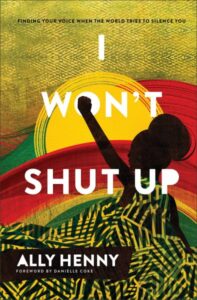 I Won’t Shut Up: Finding Your Voice When the World Tries to SIlence You Ally Henry (Baker Books) $24.99 OUR SALE PRICE = $19.99
I Won’t Shut Up: Finding Your Voice When the World Tries to SIlence You Ally Henry (Baker Books) $24.99 OUR SALE PRICE = $19.99
This book is a fabulous, if haunting and at times (for this white guy reader) a bit off-putting (or at least it made me a little uncomfortable) collection of essays that serve almost as stand alone pieces and yet congeal as a memoir of sorts. Ally Henry is a fiesty and loud writer — her word — and I want to recommend it here again, even though it came out in June. Yes! Edgy and firm as it is, it is one to read.
Ally Henry is a writer, speaker, advocate-minister, and vice president of The Witness: A Black Christian Collective (which I hope you know about; it is an organization committed to encouraging, engaging and empowering black Christinas toward liberation from racism.) She has an MDiv from Fuller and has had a long-standing blog called The Armchair Community.
She is serious and funny, frank and witty, and speaks with candor about harm and micro-aggressions and the stress and joys of being a black woman. She is, perhaps surprisingly, an introvert and she says she is shy, but has learned to navigate without compromise the often overwhelmingly white spaces she inhabits. It is a good look at the story and personality and attitude of a young black woman that many white folks need to read, especially if you find yourself wanting to police the appropriateness of some loud black behavior. She is convinced that most white people have this dismissal of certain kinds of black folks who are claiming their place, finding their voices, maybe just doing their thing. (Think of the black bird watcher in Central Park or that family just cooking out in that park out West, both stories that got in the news. Or the poor souls harassed and demeaned every single day in the United States. Check it out with an open heart, please.
There are stories here, from her girlhood and school days. It got Beth and I talking about our own memoirs of race and class and difference in our own respective schools. We appreciate her call to black women to use their voices, to tell their stories, to be loud and proud and assertive. She is firm, blunt, and in most stories — due to her fine ability as storyteller, even when it is hard — entertaining.
As Danielle Coke (herself an artist, illustrator and entrepreneur) writes in the good, brassy forward, “Your voice has unimaginable power and you have every right to use it. This book will show you how.”
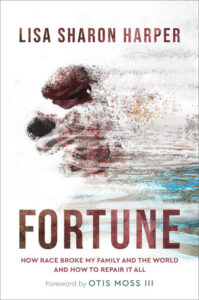 Fortune: How Race Broke My Family and the World And How to Repair It All Lisa Sharon Harper (Brazos Press) $24.99 OUR SALE PRICE = $19.99
Fortune: How Race Broke My Family and the World And How to Repair It All Lisa Sharon Harper (Brazos Press) $24.99 OUR SALE PRICE = $19.99
This is a book that I have highlighted several times — since before it even came out, actually. We highlight it again, here because we want our BookNotes friends and fans to know how we appreciate Lisa and this extraordinary book. It carries endorsements from some of the most important writers in this whole genre — Ruby Sales, for instance, who calls Harper “a masterful storyteller” and the heroic Rev. Dr. William Barber (the president of Repairers of the Breach) who says the book is simply “Brilliant.” We agree.
Kirsten Powers, CNN senior political analyst and columnist and author, notes that Lisa is one of our nations most critical voices on the issues of race, gender, faith and justice and I agree.
“Harper is one of our nation’s most critical voices on the issues of race, gender, faith, and justice.”
And so we are not alone in our affirmation of this epic story of Lisa exploring her genealogy and telling the story of her grueling and glorious research into finding her family history. From DNA research, oral history, fascinating interviews, and more, she takes us along on her journey — some of it full of pathos as we learn about who enslaved whom, who sold whom. This is hard to read, on one hand, but Lisa is brave and hopes to satisfy her longing to know of her colorful background (she is part Native, as well — you may recall her writing about that in her excellent and popular book The Very Good Gospel) even as she tells the story of “how race broke my family.
Indeed, the brokenness that race has wrought in America is part of this tender, personal story, and her big vision of collective repair is urgent. She calls for us to tell the truth, a prophetic call needed now more than ever! I beg you to read it. It is by a woman we count as a friend who is also a respected, nationally-known Christian leader who has earned the right to be heard.
Here is a great, short, and moving video of Sharon talking about the book. Check out this trailer:
AND, there is this fun news. With the soon to be celebrated 60th anniversary of the March on Washington, there is a new song that celebrates her book, putting it within the framework of the important history of the civil rights movement. With the theme of this BookNotes — centered by the must-read Saying It Loud by Mark Whitaker —it seems perfect to share this innovative bit of artful promo of Lisa’s classic book Fortune. Here is how she describes it:
“Fly” (aka “Fortune’s Song”) will be released the week of the 60th Anniversary of the March on Washington. Inspired by Fortune and co-written in partnership with Common Hymnal and Andre Henry at the Alex Haley Farm last summer, “Fly” shines light on the lies of racial hierarchy that broke the world and issues an epic call for truth and reparation.
Stay tuned for that! I’ll share it at Facebook, for sure. Hooray for “Fly” (aka “Fortune’s Song”).
THREE BOOKS TO PRE-ORDER NOW.
If you happen to be ordering more than one title along with a forthcoming one, please let us know if you want us to send the available ones now and the not-yet-released ones later, when they arrive OR should we hold up and consolidate, sending things together, later. It would be helpful to let us know how you want us to serve you in this instance. THANKS.
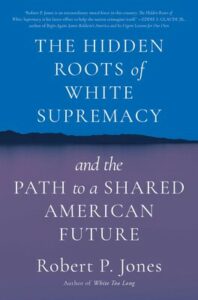 The Hidden Roots of White Supremacy: And the Path to a Shared American Future Robert P. Jones (Simon & Schuster) $29.99 OUR SALE PRICE = $23.99 // ON SALE DATE – September 5, 2023
The Hidden Roots of White Supremacy: And the Path to a Shared American Future Robert P. Jones (Simon & Schuster) $29.99 OUR SALE PRICE = $23.99 // ON SALE DATE – September 5, 2023
Oh my, when an esteemed public theologian and respected historian does a deep dive into the roots of American history to suss out ways in which racism and white supremacy has been “cooked into the cake” of our country’s past, we should all pay attention. This has been done a lot lately, from the controversial The 1619 Project: A New Origin Story to Stamped from the Beginning by Ibram X. Kendi, to the IVP Academic title We the Fallen People: The Founders and the Future of American Democracy by Robert Tracy McKenzie. A few mail order customers have ordered African Founders: How Enslaved People Expanded American Ideal by David Hackett Fisher.
Jones stands among these important scholars, a good thinker and passionate teacher himself. He is also a person of deep faith and is concerned about how these things are talked about.
Jones is the president and founder of Public Religion Research Institute (PRRI) and a leading scholar and commentator on religion and politics. Jones writes regularly on politics, culture, and religion for The Atlantic, TIME, and Religion News Service. He holds a PhD in religion from Emory University and a MDiv from Southwestern Baptist Theological Seminary.
This forthcoming one, releasing early in September, isn’t his first book on all of this. He is the author of White Too Long: The Legacy of White Supremacy in American Christianity, which won a 2021 American Book Award, and The End of White Christian America, which won the 2019 Grawemeyer Award in Religion.
We have long carried these previous two books, and in this forthcoming one, he told a group in central PA this past Spring, he is “going back to the beginning” and exploring the roots of it all. The coveted “starred review” from Kirkus Review noted that it is ”Revelatory. . . . A searing, stirring outline of the historical and contemporary significance of white Christian nationalism.”
Jones makes this narrative historical study particularly engaging (even if it isn’t exactly the very beginning of America’s original sin) because he explores the story of three locations in the United States — in Mississippi, Minnesota, and Oklahoma — where the indigenous people were driven out by European colonists, where vicious racial killings took place in the last century, and “how these places are coming to terms with the past, creating new organizations dedicated to racial repair and reconciliation as they aspire to a more inclusive, more promising future.”
Read these important endorsements to see if this is a book you should have on your bookshelves:
An essential journey into the origins of America’s current identity crisis, told through the voices of people working across lines of race to create a truer vision of our shared history, and our future. — Heather McGhee, author of The Sum of Us: What Racism Costs Everyone and How We Can Prosper Together
Robert P. Jones has deepened our understanding of how Americans think about religion, justice and oppression. . . . This eloquent volume, by turns personal and analytical, calls us to face up to the past in order to build a more just and democratic future. — E. J. Dionne Jr., senior fellow, the Brookings Institution; author of Our Divided Political Heart
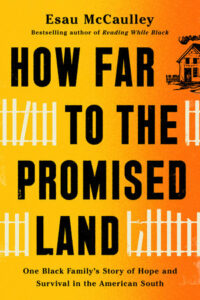 How Far to the Promised Land: One Black Family’s Story of Hope and Survival in the American South Esau McCaulley (Convergent) $27.00 OUR SALE PRICE = $21.60 // ON SALE DATE – September 12, 2023
How Far to the Promised Land: One Black Family’s Story of Hope and Survival in the American South Esau McCaulley (Convergent) $27.00 OUR SALE PRICE = $21.60 // ON SALE DATE – September 12, 2023
This is one of the most anticipated books of the season for some of our BookNotes readers, I’m sure. McCaulley is the extraordinary speaker and writer and scholar, the author of the best-selling and must-read Reading While Black: African American Biblical Interpretation as an Exercise in Hope (IVP; $22.00 – OUR SALE PRICE = $17.60.)
He is also the editor and curator behind the small “Fullness of Time” book series on the church calendar, such as his own Lent: The Season of Repentance and Renewal. (Heads up: we now have the brand new ones on Advent by Tish Harrison Warren and Christmas by Emily Hunter McGowan and hope to have soon Epiphany by Fleming Rutledge.)
How Far to the Promised Land is a memoir created within a series of essays that more or less follow his boyhood in the deep south, his coming of age amidst a father who sometimes had a needle in his arm, the rough and tumble of a hard neighborhood, serious poverty, a single mom who did well by him, the complexities of race and racism in Alabama — and elsewhere.
Dr. McCaulley, as you may know, has a fairly classic Black church background, somewhat Pentecostal, and who made his way to Gordon Conwell Theological Seminary, and, eventually, to St. Andrews where he studied with world-renowned New Testament scholar, N.T. Wright. He is an ordained clergyman, a priest in the Anglican tradition, a New York Times columnist, and a professor at Wheaton College. His hard family background (and the forgiveness that was hard coming, even after his father’s untimely death) is told honestly, with great vulnerability, and always respectfully. It is quite an accomplishment.
The book starts with a very engaging narrative of going to speak at a largely white college setting where he is asked to share, during the Q & A, the worst example of racism he himself has encountered. Something sort of snaps as it is a question black speakers who address questions of racism are often asked; in this case, he declines from answering. He explains why and it is astute, thoughtful, helpful to hear for white readers, I’m sure, and resonant to hear for people of color reading the book. Yet, he wonders. It seems this whole book is an extended answer to this fair question.
It is pitched as “a riveting intergenerational account of one family’s search for meaning and a place to call home in the American South.”
As the senior editor for the publisher wrote in an advanced copy made available to selected reviewers
At first glance, Esau’s story follows an arc that might seem family: a young black man beats the odds of growing up fatherless and being educated in under resourced schools to escape poverty and achieve a life in the middle class…” He explains more, noting that we think we know what to do with such narratives. He continues,
But Esau realized that the spotlight in these discussions is too narrow. We are persons, not storylines. And a good narrative — a Black one, at least — is not owned by any single individual; it is, instead, a story of a people, of how the struggle in each life to find meaning and purpose, regardless of its outcome, teaches us something essential about what it means to be human.
Executive Editor Derek Reed concludes his summary of some of the interesting and compelling stories in How Far to the Promised Land that “all of this comes together in an evocative, tender account that complicates the classic American success story while leaving us a hope that a better one can yet be written.” It is a testament, he says, “to what makes Esau one of the most important writers at work today.”
It is a testament to what makes Esau one of the most important writers at work today.
Some of these stories made me laugh, some made me cry, I was shocked to learn some of the hardships he has faced and glad for the way the church has so rooted and inspired him and his wife and four children. It’s a great read and I hope you pre-order it from us today.
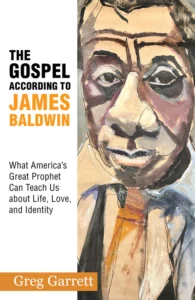 The Gospel According to James Baldwin: What America’s Great Prophet Can Teach us About Life, Love, and Identity Greg Garrett (Orbis Books) $24.00 OUR SALE PRICE = $19.20 // ON SALE DATE – September 15, 2023
The Gospel According to James Baldwin: What America’s Great Prophet Can Teach us About Life, Love, and Identity Greg Garrett (Orbis Books) $24.00 OUR SALE PRICE = $19.20 // ON SALE DATE – September 15, 2023
I like Greg Garrett a lot. He’s a lit prof at Baylor University and we first discovered him decades ago when he wrote a memoir about leaving fundamentalism to embrace Episcopalianism (cleverly called Crossing Myself.) He has gone on to write other books, studies of film and literature, a good one on “holy superheroes” and a fine study of the gospel seen in the work of U2. And he has done a few good novels (most recently, the widely acclaimed Bastille Day, published by Paraclete, that we’ve recommended.)
The Gospel According to James Baldwin does what you might expect, looking at Christian themes within Baldwin and, more generally, how Baldwin’s life and writing can inform our own views about love and identity. It is, to be sure, quite readable, but it offers a close reading of both Baldwin’s words and his legacy.
I like how the manuscript which I got the publisher to send to me send puts it:
During the reading for and writing of this book, Garrett followed in Baldwin’s physical footsteps — walking with him from his early years in Harlem to his painful journeys to the America South, from the cafes of St.-Germain in Paris to the mountains of Switzerland, where he did some of his more important thinking and writing.
Indeed, he writes of doing some of his own writing while seeing the view that Baldwin had from the Happersberger chalet in the Alps; he knows the “soul-food joints in Harlem.” I don’t mean to draw too many comparisons but I did think of one of my favorite books, the one where Jamie Smith retraces some of the not-yet-Saint Augustin’s journey in Italy. Sort of a travelogue and sort of an embodied study, Smith’s On the Road with Saint Augustine has that very real touch, and it seems some of Greg’s book does as well. You’ll like it, I’m sure. The very first sentence tells of his how-in-the-world-did-I-get-here sense of being high in the Swiss Alps; that first chapter is called “On Pilgrimage, Seeking St James.”
Greg admits to many differences between himself and the great twentieth century writer: Greg is white, was raised middle-class and mostly rural (he’s driven tractors and stacked hay bales, he notes) and while Baldwin was born and raised in black Harlem, still, there are connections. Even this oddly, sort of fascinates:
He officially left the church after early piety; I was a young religious malcontent who became deeply and even traditionally Christian in middle age.
And so the book meanders towards its study, offering writerly biographical glimpses of both men and Garrett’s remarkable experiences of teaching The Fire Next Time or “Sonny’s Blues” or Go Tell It on the Mountain, how it lingers, even among students who contact him later.
He notes a great quote — a quote I might have used in my own review of Nicholas Buccola’s book The Fire Is Upon Us, an amazingly learned and, I think, important book on the monumental University of Cambridge debate between Baldwin and William F. Buckley. Garrett quotes Buccola, saying:
For me, and for many others, Baldwin is the sort of writer who alters your perception of the world and forces you to consider and reconsider your place within it.
Dr. Garrett is conversational in his prose but has done a scholar’s bit of heavy lifting in the archival research, too. (The Baldwin Collection at the Schomburg Center for Research in Black Culture in Harlem has been just recently inaugurated.) He even visited the Lyndon Baines Johnson Presidential Library — you’ll see why.
The book is very nicely written and thoughtful as it covers Baldwin on culture, faith, race, justice, identity, and so much more. He notes that to address so much of such importance we need “an artist, a saint and a prophet.” The Gospel According to James Baldwin should release September 15th and we are eager to send a few out at our discounted price.
+++
TO PLACE AN ORDER
PLEASE READ, THEN SCROLL DOWN AND CLICK ON THE “ORDER HERE” LINK BELOW.
It is very helpful if you tell us how you prefer us to ship your orders.
The weight and destination of your package varies but you can use this as a quick, general guide:
There are generally two kinds of US Mail options (who just raised their rates again) and, of course, UPS. If necessary, we can do overnight and other expedited methods, too. Just ask.
- United States Postal Service has the option called “Media Mail” which is cheapest but can be a little slower. For one typical book, usually, it’s about $4.12; 2 lbs would be $4.87.
- United States Postal Service has another option called “Priority Mail” which is $8.50, if it fits in a flat-rate envelope. Many children’s books and some Bibles are oversized so that might take the next size up which is $9.20. “Priority Mail” gets much more attention than does “Media Mail” and is often just a few days to anywhere in the US.
- UPS Ground is reliable but varies by weight and distance and may take longer than USPS. We’re happy to figure out your options for you once we know what you want.
If you just want to say “cheapest” that is fine. If you are eager and don’t want the slowest method, do say so. It really helps us serve you well so let us know. Just saying “US Mail” isn’t helpful because there are those two methods, one cheaper but slower, one more costly but quicker. Which do you prefer?
BookNotes
SPECIAL
DISCOUNT
20% OFF
ALL BOOKS MENTIONED
+++
order here
this takes you to the secure Hearts & Minds order form page
just tell us what you want to order
inquire here
if you have questions or need more information
just ask us what you want to know
Hearts & Minds 234 East Main Street Dallastown PA 17313
read@heartsandmindsbooks.com
717-246-3333
Sadly, as of August 2023 we are still closed for in-store browsing. COVID is not fully over. Since few are reporting their illnesses anymore, it is tricky to know the reality but the best measurement is to check the waste water tables to see the amount of virus in the eco-system. It is bad; worse than it was two years ago, even. It’s important to be aware of how risks we take might effect the public good as those at risk, while not dying from the virus, are experiencing long-term health consequences. (Just check the latest reports of the rise of heart attacks and diabetes among younger adults, caused by Covid.) It is complicated, but we are still closed for in-store browsing due to our commitment to public health (and the safety of our family, staff, and customers.) Our store is a bit cramped without top-notch ventilation, so we are trying to be wise. Thanks for understanding.
We will keep you posted about our future plans… we are eager, but delayed, for now.
We are doing our famous curb-side and back yard customer service and can show any number of items to you if you call us from our back parking lot. It’s sort of fun, actually. We are eager to serve and grateful for your patience as we all work to mitigate the pandemic. We are very happy to help, so if you are in the area, do stop by. We love to see old friends and new customers.
Of course, we’re happy to ship books anywhere.
We are here 10:00 – 6:00 EST / Monday – Saturday. Closed on Sunday.

